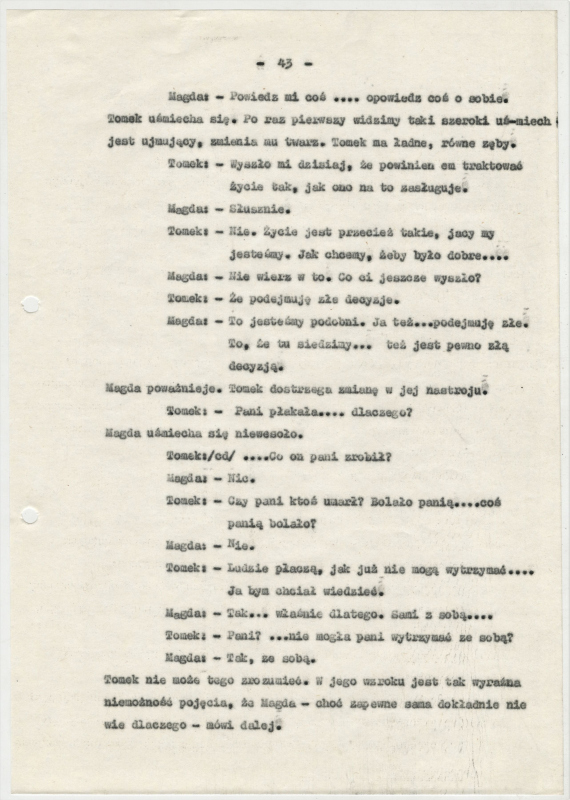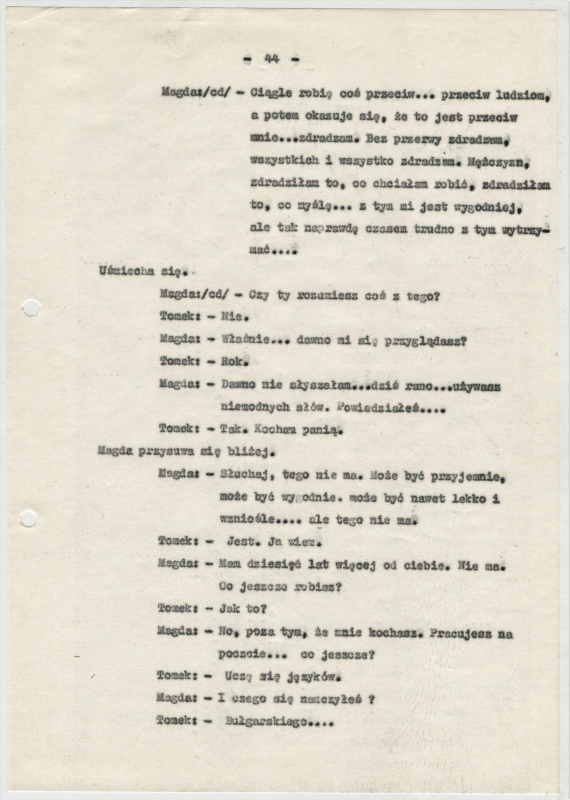Telimena Café
Located at the corner of Kozia Street and Krakowskie Przedmieście, Telimena Café continues to enjoy great popularity with Varsovians. The first café was reportedly opened at this location in 1827, and was a popular venue for art exhibitions and concerts. Razed during World War II, the building was rebuilt in 1949.
Decalogue Six
Tomek (Olaf Lubaszenko) and Magda (Grażyna Szapołowska) meet at this café on Krakowskie Przedmieście for their first serious conversation. The voyeur and the voyée sit across from each other, face to face. It is only here, for a brief moment, that their relationship becomes warm and cordial. Though Magda coldly admits that she doesn’t love Tomek, she recommends that he abandon his voyeurism and instead take up people-watching in Telimena or other cafés to learn how men express their feelings to women. It took Kieślowski a long time to find just the right actress to play the role of Magda. He shot screen tests with numerous candidates before inviting Grażyna Szapołowska to star in Decalogue Six and its feature-length version, A Short Film about Love. Szapołowska had previously played in No End (1985), Kieślowski’s first fiction film based on a screenplay co-written by the director and Krzysztof Piesiewicz. Olaf Lubaszenko, who served as the director’s assistant on the set of The Decalogue, stars as Tomek. A Short Film About Love and its creators received numerous awards at film festivals around the world, from Gdańsk, San Sebastian and Geneva to São Paulo and Chicago. The café where Magda and Tomek meet is named after a character in the epic poem Pan Tadeusz (Sir Thaddeus), by Adam Mickiewicz. Andrzej Wajda’s 1999 motion picture adaptation of the literary classic features Grażyna Szapołowska in the role of Telimena.
Mikołaj Jazdon
The Sixth Commandment:
You shall not commit adultery.
“Hair and tears”
This is a problematic commandment. Not because of what it forbids, but because of what it fails to mention. It literally forbids marital unfaithfulness (adultery, from the Latin adulterium), and thus formally makes no mention of relations between unmarried individuals. But free love was seen as physiologically “unclean” and an obstacle to marriage, and was thus socially stigmatized. Its unbridled form, promiscuity (Greek: porneia), was grounds for divorce, according to the Gospel of Mark. But it was tacked onto the sixth commandment retroactively and for moral reasons. This association proved so powerful that adultery has come to signify all forms of extramarital sex. It is this meaning of eroticism that is referenced in A Short Film About Love and its television adaptation, Decalogue Six. The tragedy of marital infidelity is also a theme in several other episodes (Decalogue Two, Decalogue Three, and Decalogue Nine).
A mature, unmarried, well-off Woman, who is disenchanted with love and has settled for bodily pleasures, experiences a fleeting moment of Love with a poor, innocent boy. It’s a miracle, considering how little they have in common. Even the Angel (Artur Barciś), who usually looks on in concern, now smiles in disbelief… Their love is true because evil cannot touch it; she is the target of the boy’s clumsy efforts at stalking, but these events are canceled by what emerges between them. Only when the Woman falls in love is she revealed to be Magdalene (like the saint of rescued love). In one telling scene late in the episode, Kieślowski gives the Woman her Name. That name. It truly is a “film about love,” because love is always hard. Did they have a chance? They were just a moment away from a sharing a fleeting instant of shared emotion. Like a fairy tale. Do they get together? There are two endings: In A Short Film About Love, Magdalena “runs to his body.” He still hasn’t awoken from the depths of his fatal injury; spotting the telescope, she recalls how she once wept, her hair down, over the “spilled milk” of her life, as if crying over a smashed alabaster vase, and then wiping his feet with that hair, as she did long ago in Bethany… In her dream she sees Him leaning over her. The name of the biblical Magdalene remains as a sign in Decalogue Six, but in a weakened form, like the symbolism of “hair and tears.” At the post office, the “resurrected” Boy shamefully hides his “stigmata”…

